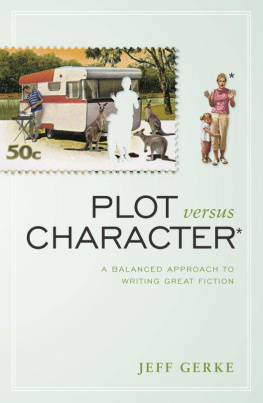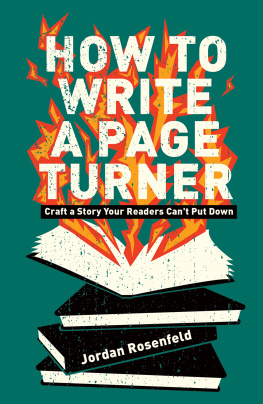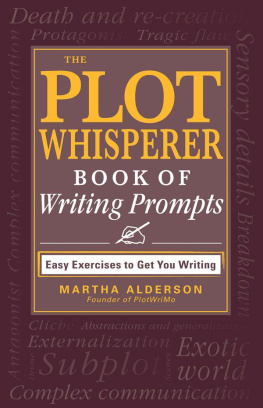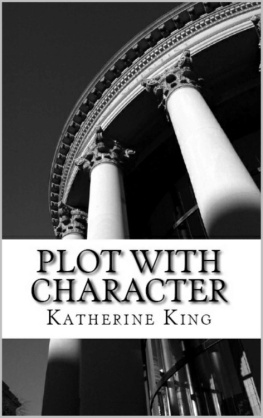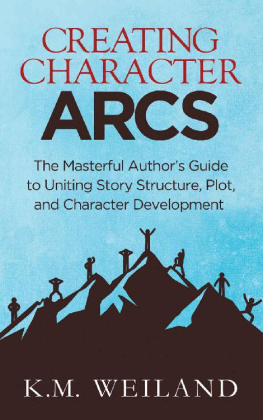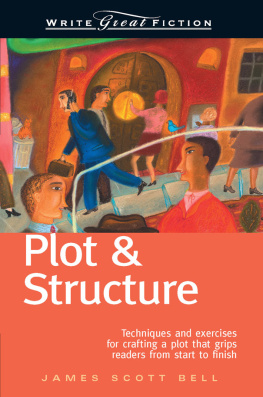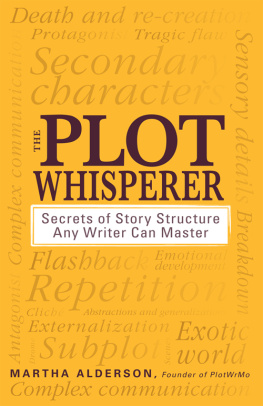PLOT versus
CHARACTER*
A BALANCED APPROACH TO
WRITING GREAT FICTION
JEFF GERKE

Plot Versus Character . Copyright 2010 by Jeff Gerke. Manufactured in the United States of America. All rights reserved. No other part of this book may be reproduced in any form or by any electronic or mechanical means including information storage and retrieval systems without permission in writing from the publisher, except by a reviewer, who may quote brief passages in a review. Published by Writers Digest Books, an imprint of F+W Media, Inc., 4700 East Galbraith Road, Cincinnati, Ohio 45236. (800) 289-0963. First edition.
For more resources for writers, visit www.writersdigest.com/books.
To receive a free weekly e-mail newsletter delivering tips and updates about writing and about Writers Digest products, register directly at http://newsletters.fwpublications.com .
14 13 12 11 10 5 4 3 2 1
Distributed in Canada by Fraser Direct
100 Armstrong Avenue
Georgetown, Ontario, Canada L7G 5S4
Tel: (905) 877-4411
Distributed in the U.K. and Europe by F+W Media International
Brunel House, Newton Abbot, Devon, TQ12 4PU, England
Tel: (+44) 1626-323200, Fax: (+44) 1626-323319
E-mail: postmaster@davidandcharles.co.uk
Distributed in Australia by Capricorn Link
P.O. Box 704, Windsor, NSW 2756 Australia
Tel: (02) 4577-3555
Library of Congress Cataloging-in-Publication Data
Gerke, Jeff.
Plot versus character : a balanced approach to writing great fiction / by Jeff Gerke.
p.cm.
Includes bibliographical references and index.
ISBN 978-1-58297-992-2 (alk. paper)
eISBN 13: 978-1-5996-3260-5
1. Fiction Authorship. 2. Fiction Technique. I. Title.
PN3365.G47 2010
808.3 dc22
2010021923

Edited by Scott Francis
Designed by Jessica Boonstra
Cover image by Rudi Tapper/ istockphoto.com
Production coordinated by Debbie Thomas
DEDICATION
To my youngest daughter, Sophia Song Taylor Gerke

ABOUT THE AUTHOR

Mary DeMuth
Jeff Gerke is a novelist and professional book doctor. He is popular at writers conferences across America as a fiction teacher. His style is informal and droll and tends toward the speculative. Jeff spent twelve years on staff at various publishing houses before launching his own small publishing company, Marcher Lord Press, in 2008. He writes under the pen name Jefferson Scott having authored such books as Virtually Eliminated , Fatal Defect and the Operation Firebrand series. His also the author of The Art & Craft of Writing Christian Fiction. Jeff and his wife of more than twenty years have three children.
TABLE OF CONTENTS
INTRODUCTION
Oh, ma hon-ey, oh, ma hon-ey, better hur-ry and lets me-an-der
Aint you go-in? Aint you go-in? To the lea-der-man, rag-ged me-ter man? Oh, ma hon-ey, oh, ma hon-ey, Let me take you to Al-ex-an-ders
Grand stand brass band, aint you com-in a-long?
They may not look like much, but these simple words sparked a revolution.
The year was 1910 and a young man named Israel Isidore Baline had written his first song, an instrumental march song called Alexanders Rag-Time Band. He was a Jewish immigrant from Russia now living in New York and trying to make it on the Broadway scene.
Alexanders Rag-Time Band got picked up by a Broadway producer and played a few times in his Folies [sic] show. But the song failed to impress audiences. After a handful of performances, it was dropped from the show. Balines first song was finished. In his own words, he considered it a dead failure.
Six months later, perhaps out of boredom or desperation, he penned lyrics to the song. They were simple words. Lowbrow, in the estimation of some. About a mundane topic: Someone taking a date to hear a band play a new musical fad.
Come on and hear! Come on and hear! Al-ex-an-ders rag-time band!
Come on and hear! Come on and hear! Its the best band in the land!
They can play a bu-gle call like you nev-er heard be-fore
So nat-u-ral that you want to go to war Thats just the best-est band what am, ma hon-ey lamb
Come on a-long, come on a-long, let me take you by the hand
Up to the man, up to the man, whos the lead-er of the band
And if you care to hear the Swa-nee Riv-er played in rag-time
Come on and hear, come on and hear,
Al-ex-an-ders Rag-Time Band.
Despite the poor grammar and trendy topic, the words resonated with listeners. Suddenly the song was in demand throughout Broadway and beyond. In a day without Facebook or Twitter, Alexanders Rag-Time Band sparked an almost overnight international dance craze and sent its composer on a meteoric rise.
Soon everyone knew his name. Only he wasnt going by Israel Isidore Baline anymore. He had since changed it to the more American-sounding Irving Berlin.
Berlin now had the chance to show he was no one-hit wonder. In his sixty-year career he wrote an estimated 1,500 songs and the scores for nineteen Broadway shows and eighteen Hollywood films, including eight that received nominations for Academy Awards. Songs he wrote include White Christmas, Puttin on the Ritz, Theres No Business Like Show Business, and God Bless America.
And it all started because he added words to his little rag-time march.
Irving Berlin has no place in American music, composer Jerome Kern later said, he is American music. Composer George Gershwin called Berlin the greatest songwriter that has ever lived.
Irving Berlin was astonished at his sudden rise to fame. As he reflected on why Alexanders Rag-Time Band had failed at first and later succeeded, he came to a conclusion: For music to live, it must be sung.
MUSIC AND LYRICS: TWO TYPES OF NOVELISTS
Nothing changed about Irving Berlins tune when he wrote the lyrics. But it wasnt until words were added that it became something magical.
Often a piece of writing can be brilliant in one area but lacking in another. Until that other area can be improved, the project will remain a dead failure.
This is just as true in writing fiction as it is in writing music.
I believe there are two types of novelists, i.e., two archetypes into which all fiction writers may be grouped. On the one hand you have those for whom plot ideas come naturally. On the other, you have those for whom characters arise with ease.
Plot-first novelists think of story ideas all day long. Theirs are the fabulous books in which many exciting things happen. The focus tends to be on the events occurring in the story rather than on the characters, and usually, lots of things blow up. I know about this kind of novelist because Im one of them.
Character-first novelists are those writers who are endlessly fascinated by what makes people tick. The fictional people they create are rich, engaging, believable, and compelling. You feel that those people truly exist.
The problem is that each kind of novelist is usually as awful at the one thing as she is terrific at the other thing. The plot-first novelist tends to create characters who are flat, unrealistic stereotypes: cardboard cutouts who, despite different moods, agendas, genders, and occupations, seem eerily similar to one another and the authors personality. The character-first novelist produces wonderfully vibrant characters but often has no idea what to make these interesting people do. Rarely do you see a novelist who is naturally good at both. I have never met one.
Next page
